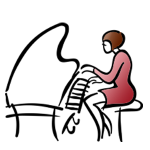 In the first part of our conversation, Jeffry George and I discussed the career path that brought him to his new position as Executive Director of Cantata Singers. In the concluding installment, we discuss why live-tweeting at concerts is not the future of music education, and confess some of our goofily wide-ranging musical tastes!
In the first part of our conversation, Jeffry George and I discussed the career path that brought him to his new position as Executive Director of Cantata Singers. In the concluding installment, we discuss why live-tweeting at concerts is not the future of music education, and confess some of our goofily wide-ranging musical tastes!
But first, a reminder: if you’re in the Boston area, you can hear the Cantata Singers on Friday, January 15, at First Church in Cambridge, performing works by Heinrich Schütz John Harbison and Maurice Duruflé. Tickets are $17, and may be purchased at the door or by calling 617-868-5885.
Miss Music Nerd: Cantata Singers does some very exciting outreach, going into classrooms and having kids create their own works.
Jeffry George: They do — it’s great. They work with composers, and it has been very successful. I believe it has served students that wouldn’t ordinarily be exposed to this type of music. I would like to see it reach out to as many students as possible. To teach composition at that age — you can’t beat it.
MMN: I didn’t take composition until I was in college, and when I think about what it would have been like to do it when I was 10 or 12, it’s amazing.
JG: Yeah, because by the time we get into college, our world has started to become smaller. When you’re young, your world is pretty big — you can just go for it! I think there’s a real lesson to be learned from young people right now – the way they multitask through media, the way they tear down the walls the rest of us have.
I’ll give you an example. I was having brunch outside one weekend in Denver. There was a young vocal group that placed themselves on the four corners of an intersection – four on each corner. Each corner did their piece, then they relayed across the street. They started to mix it up and communicate musically. It drew such an immense crowd — it was phenomenal.
Not that Cantata Singers would ever do anything like that, but I think there’s an opportunity to learn from that generation. I believe what they’re doing to be no different from the form and structure of the classical period. I don’t know if you agree with me or not.
MMN: I do! Speaking of tearing down walls and multitasking, I read an article online recently about some presenting organizations are encouraging people to tweet during concerts and blog during concerts, and this is controversial, of course, because some people find it distracting. What are your thoughts?
JG: It’s tough. Recently, I had the opportunity to manage a production of Speech and Debate, a play that involves high schoolers. I was in the back of the house one night, and saw a high school student who totally felt comfortable pulling out a cell phone and texting – after all, the topic of the play is texting and online communication! So I thought, how do we solve this issue? Because it is distracting to the rest of the audience.
In some theatres, like in some churches, they’ve created quiet rooms. The performance is piped into that room, and if a child is screaming, they can go into the room and still experience the performance. I don’t know if that’s the answer; until I see it, I don’t know I would feel about it. I would find it very odd to have someone go to the BSO or come to Cantata Singers and pull out their electronic device and start communicating. I couldn’t do it.
MMN: That was my thought. Not to be old-fashioned about it or to say, “Oh, it’s inappropriate.” But there’s a particular kind of attentiveness you need to have when you’re at a performance, that I know I can’t maintain if I’m tweeting. I might tweet, “I just heard a beautiful clarinet solo!” but while I’m doing that, I’ll miss the flute solo.
Is it possible to stay in touch with the way the world is going today, but still cultivate the ability to have that attentiveness that is, I think, nourishing?
JG: I think one of the educational messages we need to emphasize today is that the strongest form of communication is not from the one who is communicating, but from the one who is listening. The ability to listen is becoming a lost art form. We have to keep driving it home that the most important thing you can do as a human being is to listen — listen to what’s around you, listen to what people are saying, listen to the music, listen to the sounds of the city. That is the best thing you could do for yourself personally.
MMN: Do you see your work with Cantata Singers as contributing to that message?
JG: I’d like to believe so, and I think maybe the best way to do that is by example. I like to think of myself as a good listener. Sometimes, the quiet voice is the voice that can lead the best.
MMN: Do you feel that your ability to be a good listener came naturally, or did you consciously cultivate it?
JG: Consciously cultivated it.
MMN: How did you do that?
JG: Just by shutting up! No… I realized how important it was. The other thing is, I like to listen to a wide range of music, and sometimes I don’t like to be disturbed while I’m listening to it!
MMN: Who are some of the musicians you like to listen to?
JG: One the classical side, when I was in college, my greatest love was Haydn. A lot of people didn’t like him; maybe I was just being rebellious. I think some people thought he was boring. I didn’t.
I’m hesitant to name others, because I’m new to the industry.
MMN: Well, if I share with you that I love the Eagles, is that embarrassing enough to help you open up?
JG: I’ve got some favorite Latin performers: Juanes, Luis Miguel. I love good dance music. I love salsa. I like music that has many dimensions to it; I think that’s the best way to put it.
MMN: I like the idea that you like a variety of music. My personal stance is that a good musician should be able to appreciate many different kinds of music. Like Duke Ellington said, there are only two kinds of music, good music and the other kind.
JG: Absolutely.






